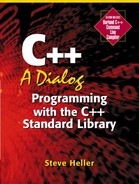Wrapping Up
The answer to the first three questions at the beginning of this chapter, as usual with such open-ended topics, is “It all depends”. Of course, I can give you some general answers. Let's start with questions 1 and 2.
If you have done all of the exercises in this book, you certainly have earned the right to call yourself a programmer — you've read quite a bit of code and have written some nontrivial programs. But, of course, this doesn't mean that you're a professional programmer. No book can turn a novice into a professional — in any field. That takes a lot of hard work, and although you've undoubtedly worked hard in understanding this book and applying your understanding to the exercises, you still have a lot to learn about programming.
Questions 3 and 4 are also closely related. You now have enough background that you should be able to get some benefit from a well-written book about C++ that assumes you are already acquainted with programming. That would be a good way to continue and the bibliography has some suggestions as to what books you might read next. As for whether we've covered everything about C++, the answer is unequivocal: absolutely not. I would estimate that you are now familiar with perhaps 10% of the very large, complicated, and powerful C++ language; however, that 10% is a good foundation for the rest of your learning in this subject. Most books try to cover every aspect of the language and as a result, cannot provide deep coverage of fundamentals. I've worked very hard to ensure that you have the correct tools to continue your learning. Good luck!
